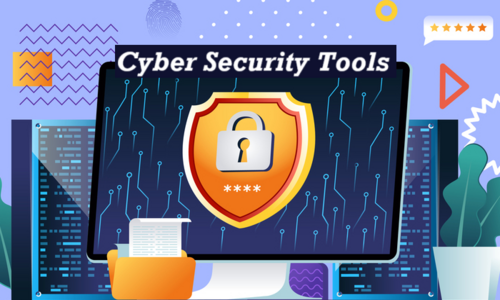In today’s digital world, organizations deal with sensitive data and financial records. Safeguarding such data requires robust cybersecurity measures. Reports like IBM’s Cost of a Data Breach and Verizon’s Data Breach Investigations Report (DBIR) show significant financial effects of breaches. Cyber security tools protect client data, brand integrity, and intellectual property. Just as our biological immune system does in the face of health risks. These tools also act as the immune system of the digital world. They guard against unwanted access and actively identify and neutralize hostile attacks. So let’s explore the best cyber security tools in 2026 and their importance in strengthening defenses.

Jump ahead to
What is a Cyber Security Tool?
Cyber security tools are software or apps created to protect against attacks and breaches. It also protects from illegal access to networks, code repositories, systems, data, and other vital infrastructure. These tools track, recognize, address, and reduce cyberattacks. Additionally, they are valuable for businesses to maintain their online security and privacy. These techniques also ensure the availability, privacy, and integrity of digital assets. As they improve security procedures and reduce downtime brought on by cyber events, they also help to increase production and operational efficiency.
Cybesr Security Tools Categories
Cyber security tools are classified into several categories. This includes
- Network vulnerability scanning tools
- Penetration testing
- Detecting network intrusions
- Encryption
- Network security monitoring
- Cloud security software
- Endpoint protection software
- Packet sniffers
- Network defences
List of 10 Best Cyber Security Tools
The following are the best cyber security tools in 2024 for safeguarding organizations against cyber threats. It also helps in preserving data integrity and fostering a secure digital environment.
Wireshark
Wireshark is a free and open-source packet analyzer. Professionals use it to sniff real-time networks and analyze network protocols. This helps them to identify and address flaws, enhancing network security. This tool also allows them to examine their network traffic closely. Then filter and drill down into it, focusing on the root cause of problems. This assists with network analysis and network security. Wireshark supports offline analysis and live capturing. Also, it is accessible with several Unix-like operating systems. It includes Windows, macOS, Solaris, Linux, OS X, FreeBSD, and NetBSD.
Metasploit
Metasploit is one of the powerful cyber security tools. It helps with penetration testing and offers information on security flaws. It identifies weaknesses in networks and systems. And develop plans to strengthen the company’s cyber security defenses. Additionally, it entails modeling an assault on a network to find weaknesses before attackers may take advantage of them. Metasploit is an open-source framework and is compatible with the various operating systems. It comprises a suite of customizable tools, including MSFconsole, Exploit modules, Auxiliary modules, Payload modules, Armitage, and Meterpreter.
Sprinto
Sprinto is a robust cyber security tool. It offers strong defense to businesses of any size. Furthermore, it simplifies compliance for cloud-based businesses. This tool assists in system monitoring with firewalls, encryption, and antivirus software. Moreover, it improves endpoint and mobile device threat visibility. Sprinto features include advanced threat detection, real-time monitoring, and rapid response capabilities. It has automated checks, continuous monitoring, and a centralized dashboard for security posture. Also, it provides customizable subscription packages per each company’s size and requirements.
John the Ripper
John the Ripper is a free password-cracking and recovery software tool. It aims to mimic the target storage mechanism’s password-handling capabilities. This enables the trial of numerous password values without relying on validation. Moreover, it is compatible with a number of operating systems, such as Linux and Windows. This tool offers different ways to speed up password breaking. It is the best option for cyber security professionals looking to improve password security as it provides precise findings from penetration testing.
Splunk
Splunk is a software framework that tracks, scans, analyzes, and visualizes computer-generated data in real-time. It is for both historical search operations to find threat intelligence and real-time network analysis. Splunk is a comprehensive system. It gathers information from throughout the network, scans it for risks, and assists in taking appropriate action. It allows to gather, compile, prioritize, and de-duplicate threat intelligence from many sources. Due to the streamlining of security operations, this enhances the effectiveness of security investigations.
Kali Linux
Kali Linux is a Linux distribution intended for penetration testing and digital forensics. This tool comes with a wide range of penetration testing tools that cover every facet of security testing. It includes social engineering, network scanning, vulnerability assessment, exploitation, password assaults, and wireless attacks. This tool helps examine security events, analyze dangerous malware, and learn about the inner workings of systems and software. It is a valuable resource for anybody working in cyber security owing to its increased emphasis on security and privacy.
Forcepoint
Forcepoint is a cyber security and data privacy platform that safeguards assets on all endpoints from a single interface. The primary target audience for this is cloud users, as it aids professionals modify SD-Wan to prevent users from accessing certain resource data. Furthermore, it closely monitors the sensitive data held by the company. A range of solutions are available from Forcepoint such as tools for controlling cloud apps, keeping an eye on data flow, and even protecting the network from illegal access.
Nmap
Nmap, also known as Network Mapper is a free network scanning and security auditing program. It assists system administrators in managing network inventories, scheduling service upgrades, and monitoring service uptime. Additionally, it examines networks and IT systems to find security flaws. Professionals use it to map out potential network attack targets. They also use it to maintain host uptime and service, and take appropriate security action. Nmap gathers information by sending data packets and examining the received answers. This aids in getting information about open ports, operating systems, and even firewalls.
Aircrack-ng
Aircrack-ng is a set of tools for assessing the security of Wi-Fi networks. It facilitates the collection of network-connected data packets for continuous monitoring. It has the capture and injection functions needed to evaluate network cards’ overall performance. Additionally, it aids in locating flaws in authentication and encryption systems. This enables companies to decide on the best course of action for enhancing their security configurations.
Nagios
Nagios is a free and open-source software application for computer systems. It assists in monitoring the health of the computer systems and network. The tool facilitates users in quickly identifying the underlying source of any issue. They can also effectively monitor a variety of networks, including NNTP, POP3, SMTP, HTTP, and ICMP, with Nagios. Nagios Core is an open-source, free version. Nagios XI and other commercial versions are available with additional capabilities.
Conclusion
Cyber security tools are necessary to stay up to date with these changing threats. They are essential for businesses trying to safeguard their digital assets. These tools deal with deficiencies, identify risks, and handle crises. Cyber security products include notifications and automated incident response capabilities. This makes rapid defense and eliminates risks. Reducing weaknesses helps companies reduce their chance of successful cyberattacks. To gain more knowledge and understanding of the above-mentioned tools, professionals can enroll in CISSP Certification Training. The course helps in gaining knowledge of cyber security tools. Furthermore, it offers skills in the ability to design, implement, and manage cybersecurity programs. This knowledge aids professionals in developing careers in the cybersecurity field.



